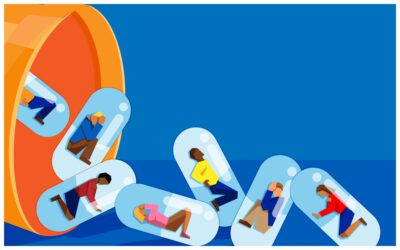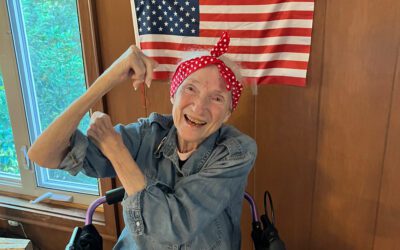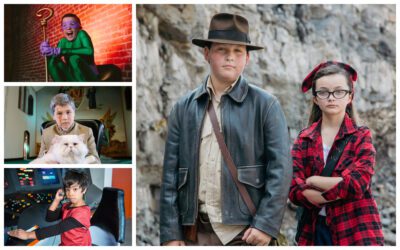[title subtitle=”WORDS Dwain Hebda
IMAGES courtesy Donna Bragg”][/title]
Donna Bragg knew that look the second the doctor came back into the room. Bad news.
“When your doctor says, ‘I need to talk to you,’ and gives you a diagnosis,” she says. “Well, it’s scary.”
Donna was no shrinking violet – in her career as a television news anchor, she’d covered the medical beat and also had the chance to interview people in the throes of tragedy. For years, viewers in Fort Smith, Arkansas, tuned in to catch the Alabama native with the electric smile deliver the news with a straightforward, honest style the audience appreciated.
“In terms of what made me good as a news anchor, that’s really hard to define,” she says. “I think a lot of it is just voice and presence and confidence, which took me a long time to build. In the end, there’s something about your credibility; it’s hard-won and easily lost.
“[As a news anchor] I’ve been told that my gift is empathetic listening. I really listened to people and people just trusted me easily, I guess. I’m honest and open and, I think, they felt comfortable entrusting their stories to me.”
Now, sitting in the examination room in 2018, the marketing executive for the Arkansas Lottery and mother of two was about to hear the words no woman wants to hear. Although it wasn’t quite the diagnosis that she was expecting.
“Lobular carcinoma in situ, LCIS,” she says, knowing you don’t know what that is. After all, she hadn’t heard of the condition either, despite covering medical news for two decades. In fact, most of her health care providers were short on details about it.
“At the time, my doctor really couldn’t even explain it to me,” she says. “So, I came home and started doing some research. I learned a lot about my diagnosis.”
What her own research didn’t tell her a follow-up with a breast specialist did. LCIS is a neoplasia, or collection of abnormal cells, located in the lobules of the breast. It is extremely hard to detect except through biopsy; hers was only revealed via routine protocols during a cosmetic surgical procedure. And while she thus says unequivocally, that “plastic surgery saved my life,” LCIS is not – repeat, not – cancer.
“I was mortified when my doctor told me, ‘You have LCIS,’ because ‘carcinoma,’ to me, meant ‘cancer’” she says. “So, I was elated when the breast specialist told me over and over again, ‘You do not have breast cancer.’”
What Donna did have in LCIS was a flashing red light announcing she was at considerably higher risk for developing breast cancer. And that translated to a year of agonizing consults and decision-making on what to do next.
“LCIS is a condition that increases your risk of developing invasive breast cancer within the next ten years after diagnosis. So, I had time. I didn’t have to make a rash decision,” she says.
“You have options. One of the options is to take a medication for five years that may lower your increased risk up to fifty percent or so. But they have yucky side effects. The other option is to do nothing; they call it ‘watchful waiting.’ Every six months, you have a mammogram and MRI and a breast examination. I did do that.”
A third option–proactive radical surgery–hung in the air. Donna didn’t like talking about it, even as she felt drawn toward that fateful course of action.
“I think I just knew. From the moment I understood what I had, I always knew that I would opt to change my odds. It just took me a while to make that decision,” she says. “The hardest part of this entire journey, for me, was making the decision to do it. I won’t say it’s easy. The process itself is not easy. I really fretted over it and it stressed me every time I had an MRI or a mammogram. I cried a lot.
“But there was one particular day where I remember distinctly that I made the decision that I’m doing this. I’m going to have a preventive mastectomy and I’m going to end this. I just put it to bed; I decided and said now let’s get busy and get it done. The truth is, I have not cried about it one day since.”
And so, the woman who’d reported on stories from Bill Clinton’s presidential bid to riding along in an F16 with the US Air Force Thunderbirds suddenly found herself the center of a new and intensely personal story. Throughout the bilateral preventive mastectomy, the reconstruction that came after and the prolonged period of recovery, all of which happened this year, she’s had time to reflect on the fragile nature of identity and self-esteem as part of the emotional component of healing.
“Maybe more so than any other body part of a woman, the breasts are the things that identify you as female, you know?” she says. “You have this relationship with your breasts throughout your life, whether it’s the teasing when you start developing breasts to feeling good about them…. Some of the most indelible memories of my life are those late-night wake-up calls to breastfeed my infants. I remember there’s something otherworldly about being able to feed your baby that way.
“Hey, breasts get attention. They get commented on. It’s something that women really identify with as part of their womanhood. So, it’s a difficult decision to say that you’re going to remove them. I don’t know that it matters whether you’re doing it preventatively or after a horrible diagnosis.”
Along the way, Donna discovered just how large a circle she had gained through her ordeal.
“There are terms for women who are going through cancer,” she says. “I’m called a ‘pre-vivor’; there are ‘pre-vivors,’ ‘thrivers,’ and ‘survivors.’ All of these women, regardless if you’re getting cancer or you’ve had cancer, they’re so supportive of each other in these online groups.
“It’s interesting. Most of my adult life has been pretty public. Because of that, I’m almost intensely protective of my private life and always have been, especially with my children, because there’s a lot of weirdos out there that, you know, pay attention to women on television. So, I didn’t really share any of this in a public way.
“Sharing this story with you, this is the first time I’m ever really sharing this story with an audience per se, aside from my friends and family, who I talk to a lot about it.”
The interview loosens the floodgates on all that she wants to say about what she’s gone through. She’s long had an idea for a blog, “Sharing with My Breasties,” where she’d talk about her experiences and the things she’s learned, in the hopes of being a beacon for someone else regardless of where they fall on the cancer spectrum.
“One of the interesting things about medicine today, even the best of doctors does not have a lot of time to sit and talk with you about everything you need to know if you’re going through this situation,” she says. “I found so many good bits of information and help and support online from blogs and Facebook groups for LCIS and preventive mastectomies. There are companies that provide bras and things like that offering great support and help. There’s this online community that is just so necessary.”
At this, Donna goes silent. A light has come on illuminating everything she wants to do next, waiting just three steps forward into the thin air. Her mind clicks. What is she waiting for?
“You know, I’ve chickened out every single time I try to activate this blog, because it’s a lot of personal info to share. I need to step out of my comfort zone and keep being brave and keep making brave decisions,” she says, her voice full and strong.
“I feel braver for having done this interview. In sharing with you this story, I’m going to go ahead and actually activate the blog and get a lot more vocal about it. It helps me to write and I have this thought that if one other woman can get help from me, then that would be worth it.”
She sits back, pulse quickened at the new, slightly scary promise she’s just made, on the record. But once again, her mind is made up, time to get going. The very thought of things reignites her radiant smile, as knowing as it is joyful.
“I want to laugh and dance and be extraordinary and skip into Heaven having lived a good life and helped a few people along the way,” she says. “My family, my children particularly, are truly everything to me. I want them to be proud of their brave momma. My mother describes it as ‘allergic to average.’ I have that disease.
“I had to grieve the loss of my breasts before I cut them off. I was so afraid of being botched and coming out of surgery looking very misaligned or weird or whatever. I was afraid that maybe, I wouldn’t look the same. Actually, I really do look the same but now, and I know this sounds so gratuitous, now I really am proud of my scars.”
Follow Donna’s continuing story at sharingwithmybreasties.com.




